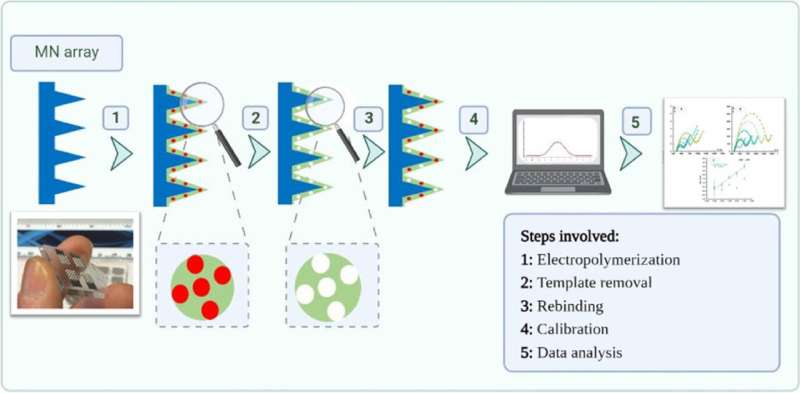This article has been reviewed according to Science X's editorial process and policies. Editors have highlighted the following attributes while ensuring the content's credibility:
fact-checked
peer-reviewed publication
trusted source
proofread
'Smart patch' could be used to detect Alzheimer's

A leading Swansea University scientist has developed a new "smart patch" that can detect proinflammatory biomarkers of neurodegenerative diseases (such as Parkinson's and Alzheimer's) through the use of microneedle technology.
This breakthrough in the advancement of transdermal capability would mean smart patches could be used to detect certain biomarkers within skin interstitial fluid (ISF) in a "bloodless" manner.
These patches are comprised of arrays of tiny needles (microneedles) designed to break the skin barrier—in a minimally invasive manner—and monitor the biomarkers of clinical significance. They can be self-administered for point of care diagnosis at GP practices or even at home. This innovative research has the potential to change the landscape of early neurodegenerative disease detection.
Dr. Sanjiv Sharma, who previously developed the world's first COVID-19 smart patch, says, "The skin is the largest organ in the body—it contains more ISF than the total volume of blood. This fluid is an ultrafiltrate of blood and holds biomarkers that complement other biofluids such as sweat, saliva, and urine. It can be sampled in a minimally invasive manner and used either for point of care testing or real time using microneedle devices."
"We employed microneedle array-based biosensing patches as wearable transdermal sensors to detect the proinflammatory cytokine IL-6. IL-6 is present in the skin ISF with other cytokines and is implicated in many clinical states including neurodegenerative diseases and fatal pneumonia from SARSCoV 2. We have been able to detect IL-6 at concentrations as low as 1 pg/mL in synthetic skin ISF, indicating its utility for routine point of care, bloodless measurements in simpler settings, worldwide."
"The devices we developed are scalable, and the resulting sensor has a short measurement time (6 minutes), with high accuracy and a low limit of detection. This new diagnostic tool, for screening of inflammatory biomarkers in point of care testing, will see the skin act as a window to the body and vital organs such as the brain."
This work was done in collaboration with Biomark, ISEP, Porto, Portugal. Co-author, Felismina Moreira from the School of Engineering, Polytechnic Institute, Portugal says, "Biomark ISEP Porto have pioneered applications of molecular imprinted polymers (MIPs) and extended them to different health care applications. Together with Swansea's expertise in transdermal diagnostics we have demonstrated that the MIPs together with the microneedle arrays offers a fantastic platform for the development of point of care devices for bloodless testing. These can be extended to diagnostics for cardiovascular, cancer and neurodegenerative disorders."
The work is published in the journal ACS Omega.
More information: Daniela Oliveira et al, Molecular Imprinted Polymers on Microneedle Arrays for Point of Care Transdermal Sampling and Sensing of Inflammatory Biomarkers, ACS Omega (2022). DOI: 10.1021/acsomega.2c04789


















